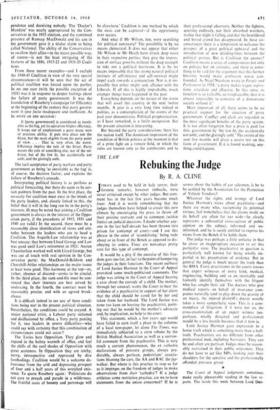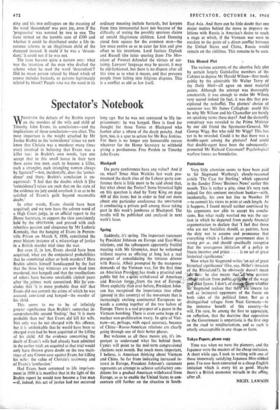Rebuking the Judge
THE LAW
By R. A. CLINE
It would be a pity if the exercise of this free- dom goes too far, in fact to the point of hampering the judges in their functions. The recent outburst of Lord Justice Harman in the Court of Appeal provoked some much-publicised comments. The judge was sitting in the Court of Appeal hearing a case about the custody of a child. The mother, through her counsel. wants the Court to hear the evidence of a psychiatrist in support of her claim that the child should be cared for by her and taken from her husband. The Lord Justice was none too keen on hearing the psychiatrist, point- ing out that he would be the mother's advocate and, by implication, no help to the court.
This statement, which a few years ago would have failed to earn itself a place in the columns of a local newspaper, let alone The Times, was immediately subjected to a stern rebuke by the British Medical Association as well as a sorrow- ful comment from the psychiatrist. This is very much a current phenomenon, the ex cathedra declarations of pressure groups, always pre- dictable, always partisan, pedestrians' associa- tions blaming the cars, the AA and RAC the jay- walker. But where is this practice to stop so far as it impinges on the freedom of judges to make observations from their 'cathedra'? If a judge criticises some restrictive practice, are we to have statements from the union concerned? If he is severe about the habits of car salesmen, is he to be scolded by the Association for the Protection of Vehicle Vendors?
Whatever the rights and wrongs of Lord Justice Harman's views about psychiatry—and there are many who, recognising its potential virtues, feel nonetheless that the claims made on its behalf are often far too wide—he clearly represents a substantial cross-section of public opinion on the subject, informed and un- informed, and he is surely entitled to express his views from the Bench if he holds them.
The judge was perhaps a little unlucky in that he chose an inappropriate occasion to air this particular view. The psychiatrist in question is particularly well known for being wholly im- partial in his presentation of evidence. But in general the judge is much nearer the truth than the BMA. Every practitioner in the courts knows that expert witnesses of every kind, medical, engineering, building and so on inevitably and humanly identify themselves with the litigant who has sought their aid. The doctors who give medical reports on behalf of insurance com- panies naturally tend to play down the gravity of an injury, the injured plaintiff's doctor usually takes a more sympathetic view. This is a com- monplace of litigation; if it were not so, the cross-examination of an expert witness (un- partisan, wholly detached and professional) would be a less hostile business than it now is.
Lord Justice Harman gave expression to a home truth which is something more than a half- truth. Psychiatrists are no different from other professional men, including barristers. They can be and often are partisan. Judges must be reason- ably restrained in their public utterances. They do not have to act like MPs, looking over their shoulders for the sensitive and the professionally offended pressure group.
The Court of Appeal judgments sometimes make really pleasurable reading in the law re- ports. The tussle this week between Lord Den- ning and his two colleagues on the meaning of the word 'descendant' was pure joy, even if the 'progressive' was worsted by two to one. The issue turned on the humble. sum of £300 and whether it could be distributed under a life in- surance scheme to an illegitimate child of the deceased insured. It could if he was a 'descen- dant,' it could not if he was not.
The issue became quite a narrow one : what was the intention of the man who drafted the scheme when he used the word 'descendant'? Did he mean person related by blood which of course includes bastards, or persons legitimately related by blood? People who use the word in its ordinary meaning include bastards, but lawyers from time immemorial have not because of the difficulty of testing the possibly spurious claims of untold illegitimate children. Lord Denning stood four square for the common man—the law must evolve so as to cater for him and give effect to his intentions. Lord Justices Diplock and Russell (the latter quoting from The Mer- chant of Venice) defended the virtues Of cer- tainty. Lawyers' language may be quaint, it may be old-fashioned, but there is no dispute after all this time as to what it means, and that prevents people from falling into litigious disputes. This is a conflict as old as law itself.







































 Previous page
Previous page